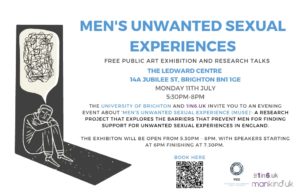The MUSE project exhibition and talk
The Ledward Centre, Brighton, BN1 1GE, Mon 11th July 2022 5.30pm - 8.00pm, FREE entry, ticketed event

1in6uk is delighted to be supporting – as project partners – along with MankindUK and John Ralphs, the Men’s Unwanted Sexual Experiences (MUSE) project event with the research team Dr Carl-Bonner Thompson, Dr Kirsty McGregor and Dr Jason Preston.
The event will include talks from the research team, representatives from 1in6.uk and a panel discussion with Lucy Hughes, CEO of Mankind UK, Patrick Sandford, survivor, writer of GROOMED, trustee of Mankind UK, and YouTuber, Stephen Hart, who toured his one-man show called Shadowed Dreamer in New York; a story about the secrets that we grow up with and how damaging they can be. It’s also a story of survival, hope, and determination that took the audience on what was described as a rollercoaster of emotions.
Timings of the project event:
5.30 – 6.00pm – Exhibition of work that was created by participants during the project
6.00-7.30pm – Talks and panel discussion
7.30-8pm – Exhibition and drinks* reception
About the project
Men’s unwanted sexual experiences – or sexual violence and harassment towards men – are receiving growing attention from charities, academics and policymakers. A recent survey by ManKindUK for 1in6.uk highlighted that 42% of men in the UK have experienced at least one form of unwanted sexual contact in their lives and they rarely seek formal support.
The MUSE project explores the barriers men experience when trying to seek support (both formal and informal). The project, based at University of Brighton, has interviewed men in South East and North East England who have had unwanted sexual experiences. The project has also conducted arts-based workshops with participants to explore the relationship between masculinity and sexual harassment and violence. The aim of the project is to explore how to create better pathways for men to find support. For more information, see our website.
The MUSE project sought to explore where men who had unwanted sexual experiences looked for support and how supportive they found it. The initial findings from the southeast of England phase of the MUSE project found:
- 27% of men accessed formal support from established services for unwanted sexual experiences. These services included therapy (21%), the police (5%), Victim Support (5%), and specialist rape and sexual assault services (5%).
- An additional 16% had formal support where their unwanted experiences ‘came up’, for example, when in therapy or when going to their GP for another reason.
- Men who did seek formal support experienced a range of positive and negative responses to their disclosures, highlighting opportunities for improvement.
- 83% of men accessed informal support, from friends (53%), family members (22%), partners (10%), teachers (10%), colleagues (5%), and their hairdresser (5%).
- Informal support varied in helpfulness depending on who the men spoke to and their response, highlighting opportunities for awareness raising.
- 16% of men did not access support or disclose their experiences to anyone.
The next stage of this analysis will be to map participants’ help-seeking journeys to identify patterns in help-seeking, barriers to support for men and opportunities for innovative practice.
Book free tickets for the MUSE project event on July 11th here
About the research team
Dr Carl Bonner-Thompson
Carl is a human geographer interested in masculinity, sexuality and digital cultures. Carl often focuses on emotions in his work, particularly in his research about men. He is interested in the way that men ‘care’, challenging longstanding assumptions that men are unable to be vulnerable and care for others. Carl has worked with young men in seaside towns and young children in the Northeast to explore relationships between masculinity, violence, care and emotion. He uses qualitative methods that include interviews, focus groups, participant diaries and creativity.
Dr Kirsty McGregor
Kirsty is a feminist and queer criminologist interested in how intersectional power dynamics operate at individual, cultural and societal levels to create contexts in which violence occurs. She uses intersectional feminist frameworks to explore how people experience relationships with one another, including through digital platforms. She uses qualitative and mixed methods to explore these issues, and more recently has become interested in participatory and creative methods.
Dr Jason Preston
Jason is interested in masculinity and ethics of care. As a sociologist, Jason is interested in the ways that cultural norms and expectations can shape everyday lives, particularly in relation to men’s interpretations of emotions, vulnerability, and care. He uses qualitative methods including interviews and observations to understand the contexts of everyday lives, exploring how individual circumstances can influence men’s behaviour, perspectives, and well-being.
Jon Ralphs
Jon is a visual practitioner and uses his clinical management and art degrees to facilitate individual and small group exploration of complex themes through pictures, words and colours. His ability to translate abstract concepts into graphic processes and illustrations have been widely used in government and professional publications. As a graphic recorder, Jon uses grounded theory graphic processes to capture people’s stories and aspirations to inform services and support commissioners to be ‘person-centred.’
ManKindUK are a Sussex-based charity offering support for men affected by unwanted sexual experiences.


